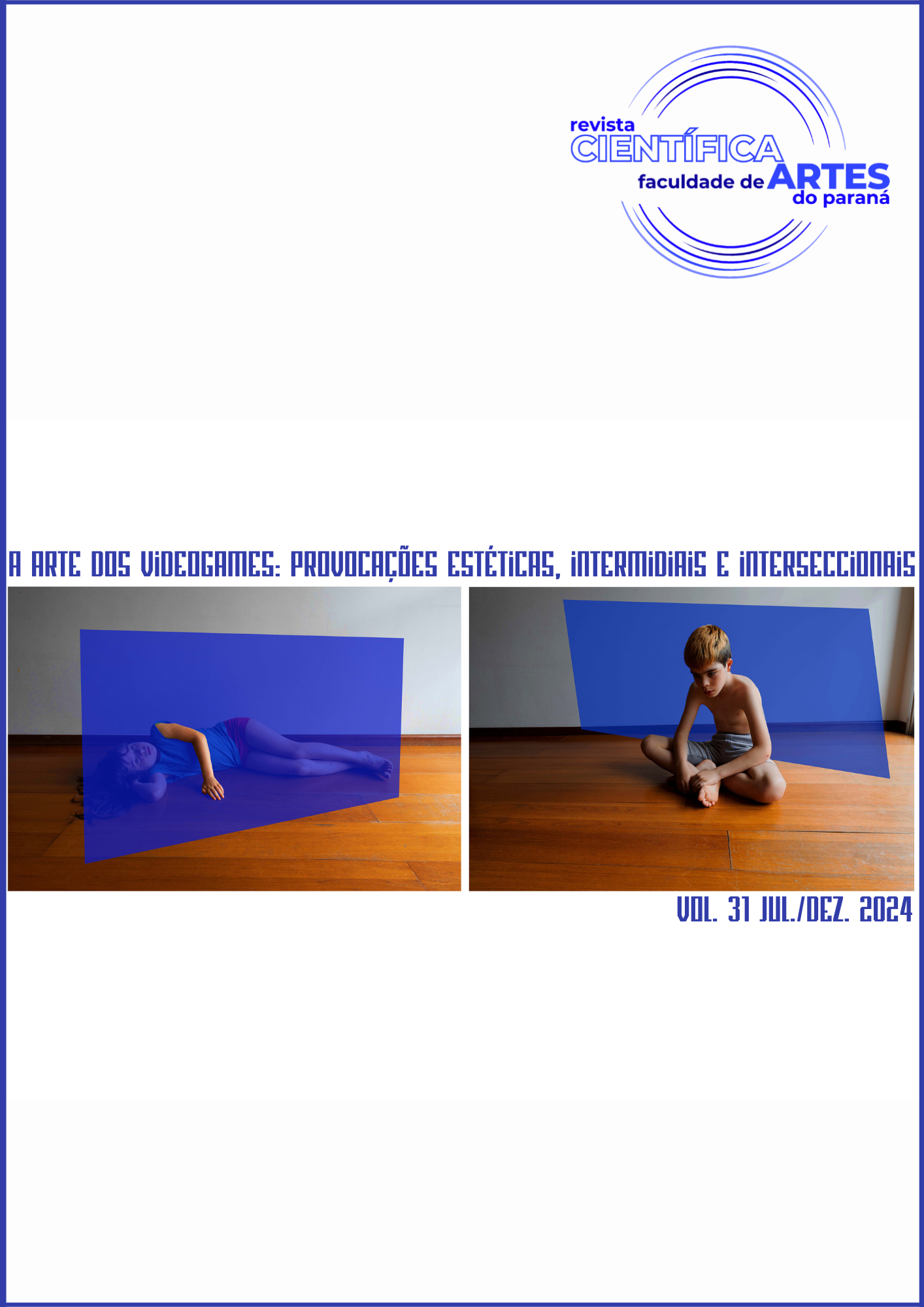DIGITAL GAMES AS CYBERTEXTS AND ERGODIC PHENOMENA
THE CASE OF SUBNAUTICA (2014)
DOI:
https://doi.org/10.33871/19805071.2024.31.2.9617Keywords:
Cybertext, Ergodic Literature, Aesthetic experience, SubnauticaAbstract
The aim of this research is to discuss digital games from the cyber textual perspective of the ergodic phenomena theorized by Espen Aarseth (1997). The idea of cybertext is proposed so that various objects can be contemplated within literary studies, making up those whose main characteristic is the ergodic phenomenon, that is, the possibility of interpretation and multiple exploration of the text by the reader, as is the case with video games. Through a case study of the game Subnautica (2014), we point out how these proposals contribute to an analysis of the exploration and interpretation of users' aesthetic experiences in games that benefit from graphic advancement. In doing so, we identify ergodic structures in the game that enable unique forms of experience, and reflect on how these are evoked through game design. We also consider that, as suggested by Aarseth (1997) and Sicart (2005), these theories emphasize the place of game users in an interactive context surrounded by moral and ethical values: they are consumers who produce their experiences and interpretations based on coded architectures.
Downloads
References
AARSETH, Espen. Cybertext: Perspectives on Ergodic Literature. Baltimore: The Johns Hopkins University Press, 1997.
AARSETH, Espen. Aporia and Epiphany in Doom and The Speaking Clock: the temporality of ergodic art. In: RYAN. Marie-Laure (org.). Cyberspace Textuality: computer technology and literary theory. Indiana: Indiana University Press, 1999.
AARSETH, Espen. Genre Trouble. Electronic Book Review, 21 mai. 2004. Disponível em: <https://electronicbookreview.com/essay/genre-trouble>. Acesso em: 23 jan. 2021.
AARSETH, Espen. I Fought the Law: Transgressive Play and The Implied Player. In: Proceedings of the 2007 DiGRA International Conference: Situated Play, 4., Tóquio, 2007. Anais… Tóquio: The University of Tokyo, 2007. p. 130-133.
BONENFANT, Maude. Le libre jeu: réflexion sur l’appropriation de l’activité ludique. Montréal: Libre, 2016.
CANCLINI, Néstor García. Emergencias culturares: Instituciones, creadores y comunidades en Brasil y en México. Ciudad del México: Gedisa Editorial, 2023.
DEWEY, John. L’art comme expérience. Paris: Editions Gallimard, 2014.
FERREIRA, Emmanoel. Ludicidade e experiência estética: uma abordagem a partir do pragmatismo (quests iniciais). In: 43º Congresso Brasileiro de Ciências da Comunicação, 43., Salvador, 2020. Anais... Salvador: UFBA, 2020a. P. 1-14.
FERREIRA, Emmanoel. O jogo não acabou: relações entre apropriação lúdica e produção de sentido nos videogames. Revista Famecos, v. 27, n. 1, p. 1-13, 2020b.
JENKINS, Henry. La culture de la convergence: Des médias au transmédia. Paris: Armand Colin, 2013.
JUUL, Jesper. Half-Real: Videogames entre regras reais e mundos ficcionais. Blucher: São Paulo, 2019.
KWASTEK, Katja. A estética do jogo. In: FERREIRA, Emmanoel; CARDOSO FILHO, Jorge (Org.). Estéticas do lúdico: os jogos digitais numa perspectiva comunicacional. Salvador: Edufba, 2024. p. 15-50.
LIVINGSTONE, Ian. A Masmorra da Morte. Tradução: Gustavo Brauner. Editora Jambô: Porto Alegre, 1984.
MURIEL, Daniel; CRAWFORD, Garry. Video Games and agency in contemporary society. Games and Culture, v. 15, n. 2, p. 138-157, 2020.
MURRAY, Janet. Hamlet on the Holodeck: The Future of Narrative in Cyberspace. Cambridge: The MIT Press, 2017.
NGUYEN, C. Thin. Games: agency as art. New York: Oxford University Press, 2020.
PIRES JUNIOR, João Reynaldo. Ler por labirintos: literatura ergódica e letramentos no game the legend of zelda: ocarina of time. 2016. 167 f. Dissertação (Mestrado em Linguística Aplicada) – Instituto de Estudos da Linguagem da UNICAMP, Campinas, 2016.
SICART, Miguel. The Ethics of Computer Game Design. In: DiGRA 2005, 3., Vancouver, British Columbia. Proceedings […]. Vancouver, British Columbia: 2005, p. 1-15.
TEIXEIRA, Luís Filipe B. Criticismo Ludológico: Simulação Ergódica (Jogabilidade) vs Ficção Narrativa. Observatório (OBS*) Journal, Lisboa, v. 2, n. 1, 2008.
Downloads
Published
How to Cite
Issue
Section
License
The authors retain the copyright, when licensing their production in Revista Científica/FAP, which is licensed under a Creative Commons license. When submitting the article, and upon acceptance, the author assigns his copyright for publication in that journal.
Readers can download, print and use the articles published in the journal, as long as there is always an explicit mention of the author (s) and the Revista Científica/FAP, no changes to the original work are allowed. When submitting an article to Revista Científica/FAP and after its being accepted for publication, the authors allow, without remuneration, to pass the following rights to the Journal: the first edition rights and the authorization for the editorial team to transfer, according to their judgment, this article and its metadata to indexing and reference services.


